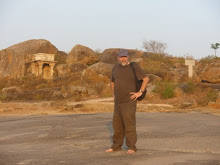
The idea that we live in an age of decline is such a common complaint that we almost take it for granted. And the evidence seems to be that people have repeatedly succumbed to this idea in very different times and in very different places. Two and a half thousand years ago, over in China, Confucius looked back to the past and the great sage-kings Yao, Shun, and Yu, and – wondering what had gone wrong – thought “My, wouldn’t it be good if rulers today could be like them?” These days, now that Confucius is himself an ancient, we look back at him and think, “My, wouldn’t it be good if sages today could be like him.” Meanwhile, in India, certain early Buddhist texts make the same complaint: things aren’t what they used to be. The world is already in a state of decline. And today Buddhists look back and say to themselves, “Well, folks back then were really pretty splendid… We’re just not up to it.”
It appears that the ancients are much more magnificent figures than we ourselves are or ever could be. And such dreams of magnificent ages of wisdom located in the deep past are seductive. When we succumb to them, we might even allow ourselves to think (but perhaps not to admit too freely) that back then, if we had been around, we’d probably have been magnificent too. But then we shrug. What can we do? We are necessarily the children of our age.
Whilst I think that this tendency to overestimate our forebears is largely unhelpful, I do however think that there is a connection between wisdom and the past, although it is not necessarily the connection that we might think it is. Wisdom – or the kind of everyday wisdom that is worth wanting – may not have been any more prevalent in the past; but wisdom may turn out to depend upon some sense of the past. Here I’m thinking of Walter Benjamin’s definition of wisdom: counsel woven into the fabric of everyday life. Stories, accumulated experiences, attention to the world… these are the things that we weave together into the fabric of our lives to find counsel. The forgetting of the past does us no favours if we cherish wisdom (as philosophers claim they do); but this does not mean that folks in the past were in general any more or less wise than we are now. And if they seem so, the reason is probably that they are, in a very real sense, fictional characters. Failing to see this leads us into the trap of thinking that way back then, everything was somehow suffused in a holy and unworldly glow. This, in turn, can lead on the one hand to a kind of dismal perspective on the present, and on the other hand to unreasonable expectations of what the limits of human possibility might be.
(. . .) If we allow ourselves to be seduced by stories of incense-perfumed ancients who drift around soft smiles, beaming out rays of light that reflect their perfect virtue, then we are at risk of finding ourselves aspiring to a kind of wisdom that is – and never has been – possible.
More























